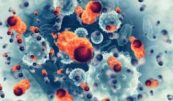CAR T-cell treatment provides significant remission rates in clinical trials
Feb 2023: In a Phase III study, a CAR T-cell therapy more than tripled progression-free survival compared with standard care for triple-class exposed multiple myeloma.
Abecma (idecabtagene vicleucel) chimeric antigen receptor (CAR) T-cell therapy more than quadrupled progression-free survival compared to standard care for triple-class exposed multiple myeloma, according to Phase III research KarMMa-3 results (MM).
Abecma is the first and only CAR T-cell treatment to exhibit superiority over standard regimens in a randomised, controlled Phase III trial for this indication.
Anne Kerber, Senior Vice President, Cell Therapy Development at Bristol Myers Squibb explained the intention behind developing Abecma: “We sought to deliver a personalised therapy that provides durable outcomes with a single infusion to advance the multiple myeloma treatment paradigm for patients.”
Ultimately, this goal proved successful. Abecma reduced the risk of disease progression or death by 51 percent versus standard regimens in earlier lines of therapy for RRMM in the trial. The results means the therapy has the potential “… to become a standard of care [in earlier lines],” suggested Dr Sergio Giralt, Division of Hematologic Malignancies, Memorial Sloan Kettering Cancer Center.
“Compared with standard treatment, there was a nearly sevenfold increase in complete remission rates — meaning that no cancer could be detected in the body after the treatment,” stated Dr Giralt.
Remission rates in the trial were as follows:
- In the ide-cel group, 33 percent had a complete remission
- In the standard therapy group, five percent had a complete remission.
The time period for patients’ cancers to come back after treatment were:
- In the ide-cel group, the average time was 13.3 months
- In the standard therapy group, the average time was 4.4 months.
How CAR T-cell therapy ide-cel works
Dr. Giralt noted that the CAR T-cell therapy recognises and attaches to B-cell maturation antigens (BCMA) on the surface of MM cells, resulting in the proliferation of CAR T cells, the production of cytokines, and the cytolytic destruction of BCMA-expressing cells.
Similar to other CAR T therapies, ide-cel use the patient’s own cells to combat cancer. T cells, a kind of white blood cell, are extracted from the patient via vein. These T cells have been modified to recognise cancer cells. The modified cells are cultivated in vast quantities. They are then returned to the patient so that they can seek out and eliminate the malignancy.
In the instance of ide-cel, the T cells are modified to recognize the BCMA protein. This protein is present in the cancer cells of multiple myeloma patients.
About the KarMMa-3 study
In the open-label, global, randomised, controlled trial, two-thirds of multiple myeloma patients received ide-cel and one-third received standard care, which consisted of a monoclonal antibody drug, a proteasome inhibitor, or chemotherapy.
Abecma exhibited a consistent and generally predictable safety profile, including no new safety signals, with mostly low-grade occurrences of cytokine release syndrome (CRS) and neurotoxicity.
The trial data is published in The New England Journal of Medicine and was presented at the The European Society for Blood and Marrow Transplantation (EBMT) and the European Hematology Association’s (EHA) 5th European CAR T-cell Meeting.
The companies intend to include these data in a planned supplemental Biologics License Application (BLA) submission to the US Food and Drug Administration (FDA) in 2023.
Abecma is approved in the European Union (EU), Switzerland, Japan, Canada, the UK and Israel for adult patients with triple-class exposed RRMM after three to four or more prior lines of therapy.
Abecma is being jointly developed and commercialized in the US by Bristol Myers Squibb and 2seventy bio.
Dr. Nishant Mittal is a highly accomplished researcher with over 13 years of experience in the fields of cardiovascular biology and cancer research. His career is marked by significant contributions to stem cell biology, developmental biology, and innovative research techniques.
Research Highlights
Dr. Mittal's research has focused on several key areas:
1) Cardiovascular Development and Regeneration: He studied coronary vessel development and regeneration using zebrafish models1.
2) Cancer Biology: At Dartmouth College, he developed zebrafish models for studying tumor heterogeneity and clonal evolution in pancreatic cancer.
3) Developmental Biology: His doctoral work at Keio University involved identifying and characterizing medaka fish mutants with cardiovascular defects.
4) Stem Cell Research: He investigated the effects of folic acid on mouse embryonic stem cells and worked on cryopreservation techniques for hematopoietic stem cells.
Publications and Presentations
Dr. Mittal has authored several peer-reviewed publications in reputable journals such as Scientific Reports, Cardiovascular Research, and Disease Models & Mechanisms1. He has also presented his research at numerous international conferences, including the Stanford-Weill Cornell Cardiovascular Research Symposium and the Weinstein Cardiovascular Development Conference.
In summary, Dr. Nishant Mittal is a dedicated and accomplished researcher with a strong track record in cardiovascular and cancer biology, demonstrating expertise in various model systems and a commitment to advancing scientific knowledge through innovative research approaches.
- Comments Closed
- February 21st, 2023





idecabtagene vicleucel, KarMMa-3
CancerFax is the most trusted online platform dedicated to connecting individuals facing advanced-stage cancer with groundbreaking cell therapies.
Send your medical reports and get a free analysis.
🌟 Join us in the fight against cancer! 🌟
Привет,
CancerFax — это самая надежная онлайн-платформа, призванная предоставить людям, столкнувшимся с раком на поздних стадиях, доступ к революционным клеточным методам лечения.
Отправьте свои медицинские заключения и получите бесплатный анализ.
🌟 Присоединяйтесь к нам в борьбе с раком! 🌟